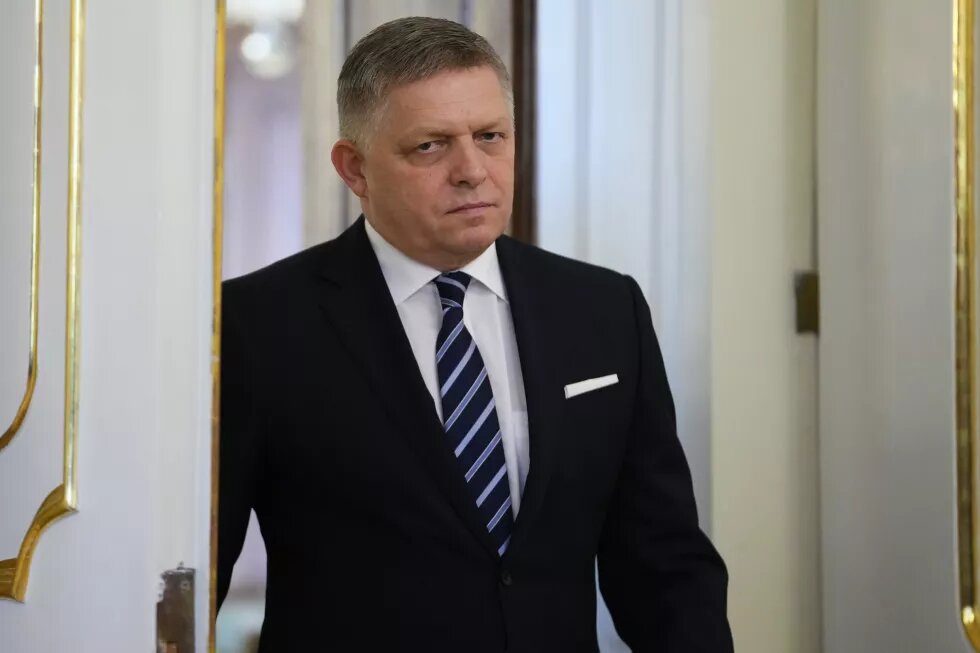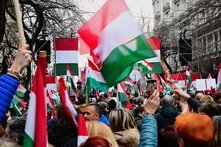Robert Fico is back as Prime Minister of Slovakia. What does his election victory mean for the democratic opposition and civil society? What should the EU be prepared for? And which lessons can be determined for democracy?

On October 1, Slovakia woke up after the snap parliamentary elections to a scenario that seemed unimaginable five years ago. Back then, Prime Minister Robert Fico was forced to resign following the murder of investigative journalist Ján Kuciak and his fiancée Martina Kušnírová in 2018 and the revelation of corruption scandals that reached the highest levels of politics and the judiciary. Now Fico is back as the clear winner of the election–with 23% of the vote–and has now also been confirmed as Prime Minister. His campaign relied on pro-Russian, homophobic and anti-EU messages.
Fico’s comeback provokes many questions. Should we fear that the new government will reshape the country according to an illiberal playbook, step by step? Will Slovakia turn its back on its neighbor Ukraine, which it has actively supported so far? Has the EU and NATO’s reliable ally now been replaced by a new problem child? And what lessons about making European democracies more resilient can the Slovak case teach us regarding the rise of right-wing populists?
No social democrat
The fact that the radical right-wing SNS (Slovak National Party) is part of Fico’s governing coalition very clearly shows that neither Fico's SMER-SSD (Direction - Slovak Social Democracy) nor its split-off, the HLAS-SD (Voice - Social Democracy) party are actually social democratic parties. The European party family PES, to which both parties belong, also came to this conclusion in the course of forming a government in Slovakia and suspended the SMER-SSD and HLAS-SD. This decision was also welcomed by the European Parliament’s S&D Group.
Many Slovaks also have no illusions about the election winner Fico. They see two main motives behind his return: First, revenge on those he blames for his downfall and second to escape the criminal consequences of the corruption scandals in which he is involved. From the perspective of his critics, the fear that Fico’s government could weaken the rule of law in order to protect itself and others from further investigations and punishments has been realized faster and more obviously than expected. Dismissing the Chief of Police was the first move by the newly appointed Interior Minister Šutaj-Eštok (HLAS-SD). In the coalition agreement, the cabinet also announced plans to reduce penalties for white-collar crime and corruption.
At least Fico’s government, in contrast to that in Hungary, does not have the two-thirds majority needed to amend the constitution. This means it has less freedom to tear down the rule of law and dismantle democratic institutions. However, it can still do plenty to make life difficult for its critics. They are mostly figures from the media and civil society who were repeatedly attacked by Fico during his campaign. As Prime Minister, he wants to follow through and harass disliked organizations: immediately after his victory, he introduced the “foreign agent” label familiar from Russia and other autocracies, and also included it in the coalition agreement. This label is applied to organizations that receive foreign funding. The cabinet is also planning several measures that affect the media: from the restructuring of public television and radio broadcasters to the reallocation of state advertising contracts and blocking information from media they do not support–which is the situation in Hungary as well.
Five years ago, Slovak civil society and media demonstrated their strength and clout. The corruption scandals under the Fico government came to light because of their efforts. They called for protests that brought tens of thousands of protesters to the streets and led to a change of government. Fico is already aware of how dangerous his critics could potentially become, which is why he wants to weaken them. Voices critical towards the government will need resilience and resources. They will also need support from Brussels and other EU member states and, most of all, from the opposition.
This support is already in place. While the Progressive Slovakia (PS) party was unable to defeat Fico, with just under 18 percent became the second strongest party. In the words of its leader Michal Šimečka, it promised to be a “tough opposition and the guardian of democracy in parliament”. This relatively young party already has several MEPs but was not represented in the Slovak parliament during the last legislative period. If it wants to live up to its promise, it must quickly learn to stand up to the government as the strongest opposition party.
No more weapons for Ukraine?
The decisive question for the new Slovak government’s foreign and European policy is whether Fico will return to his earlier strategy of playing the role of a populist in Bratislava and a pragmatist in Brussels. A first important litmus test for Slovakia’s foreign policy strategy was whether Fico would agree to an additional EU aid package for Ukraine at the EU summit at the end of October 2023.
Before the election, Fico made headlines by stating that Slovakia would “not send a single cartridge to Ukraine” if the SMER-SSD won the election. This was a surprising announcement from a country that was the first EU member state, along with Poland, to provide Ukraine with fighter jets and which has taken in over a hundred thousand refugees to date. Even before departing for Brussels, Fico criticized the aid package and during the summit he was also vocal in demanding guarantees that the aid would not be misappropriated in Ukraine and that Slovak companies would be involved in the reconstruction of the country. After communicating this message for his audience back at home, he voted in favor of the package. This led the Estonian Prime Minister Kaja Kallas to comment that “as long as top politicians from EU member states say the wrong things and do the right things, everything is fine.” However, this comment ignores that Fico’s actions are causing damage in Slovakia. Fico is fueling his citizens’ mistrust of the EU with his rhetoric.
It should be assumed that Fico will continue to make further foreign policy decisions in a calculating and cynical manner based on ostensibly “Slovak national interests” and their “market value” for his electorate. Correspondingly, Slovakia will no longer provide Ukraine with weapons from its supplies. However, experts claim this amounts to a difference that is symbolic at most, because all available military equipment had already been delivered under previous governments. Beyond that, Fico does not want to restrict commercial deliveries from Slovak arms manufacturers and envisions opportunities for the Slovak economy in participating in Ukraine's post-war reconstruction, especially in eastern Slovakia, which borders Ukraine.
It is also likely that, in his political decisions, Fico will grant Slovak national interests with a much stronger role than his friendship with Viktor Orbán. The latter used social media to announce his delight at Fico’s election victory, hoping for an ally in the EU and the Visegrád Group. Although Orbán is an obvious inspiration for Fico in many ways, his interest in access to EU funds could ultimately prevail. Fico absolutely needs these funds to fulfill his promise of economic stability and prosperity. The government’s coalition agreement promises both an expansion of the welfare state and a consolidation of the national budget–which is hard to achieve and does not allow him to reject sources of income. For that reason, Fico will likely avoid crossing red lines that could lead to EU funds being frozen, as with Poland and Hungary.
Fico is also committed to a “policy of the four cardinal points”[1]. Behind this phrase lies the intention to shape foreign policy cooperation purely according to currently defined national interests, not oriented around European and Western partners. This will make Slovakia an unpredictable and unreliable partner in Europe, which opens the door to closer cooperation with autocratic states such as Russia. During the run-up to the election, all of the governing coalition’s three parties expressed an interest in expanding relations with China.
Such a policy of national egoism could lead to the isolation of Slovakia, a small country with strong economic ties to the EU and a member of the eurozone, which cannot truly be in the country’s interests. As long as Fico’s domestic political interests prevail, he will most likely pay little attention to the negative effects his foreign policy has on the country. In the past, EU and foreign policy was not his area of expertise. Previously, he had delegated this field to Miroslav Lajčák, an experienced diplomat who is now the EU's Special Representative for the Belgrade-Pristina Dialogue and other Western Balkan regional issues. However, Fico’s new foreign minister suggests that this could now change. For this important post, he selected Juraj Blanár, a fellow party member and a very loyal regional politician with no foreign policy experience and limited English skills. This makes it easier for Fico to bring this area of policy under his control.
Three lessons from the Slovak elections
The success of right-wing populists and nationalists is a disturbing trend currently threatening many democracies in Europe and the world. Under these circumstances, it would be too simplistic to view the election results in Slovakia as a quirk of East Central Europe. Instead, it is important to discover what can be learned to make other European democracies more resilient to such developments and to prepare for upcoming elections, especially the European elections in June 2024. In my opinion, there are three important lessons to be learned from the election results in Slovakia:
-
Poor governance means less trust–in democracy
Following the assassination of Ján Kuciak and the uncovering of the corruption scandals, Robert Fico’s political career was seemingly at an end. The surprise winner of the election in 2020 was Igor Matovič and the OL’aNO (Ordinary People and Independent Personalities), primarily on the basis of one promise: demolishing corrupt structures and restoring the independence of the judiciary and police. However, this government soon devolved into personal squabbles and chaos and was more notable for its incompetence than its success in fighting corruption. Only one year later, Matovič was unsustainable as the head of government and swapped posts with his party colleague and Finance Minister Eduard Heger. However, this did not avert the premature end of the government.
After less than three years under the leadership of Matovič, the Slovaks’ trust in parliament and the government was at an unbelievable 14 percent. With trust in politics so shaken, denouncing corruption under the previous Fico governments was hardly effective. If voters generally have no trust in politics, then every politician is potentially corrupt in their eyes and acts in their own interest, not that of the public. Fico might be corrupt, but for many he appeared to be the lesser of two evils with his promise of leadership, experience, and stability. In Slovakia, the cost of poor governance was not only paid by democratic parties but has led to a general weakening of democracy.
-
Nationalism camouflaged as social policies functions as a band-aid solution
Like all countries in East Central Europe, Slovakia has gone through a socio-economic transformation since the 1990s. In many respects this was successful, but it took little consideration of social hardship. For many people, neoliberal reforms, privatization and the widening gap between rich and poor have led to frustration and the feeling of isolation, especially in rural regions. Against this backdrop, this revives nostalgic memories of socialism, which in addition to a lack of political freedom, brought economic development and modernization to rural regions–which also offers a partial explanation for the widespread Russophilia in Slovakia. Politicians do not have to be extraordinarily talented or charismatic to attract the attention of those people, using a mixture of a social and nationalist political agendas focusing on the past. Social promises function as a bandage for individual worries and troubles–frequently serious–while the idea of a national community addresses the perceived powerlessness of many voters.
-
Regaining trust through honesty
In its campaign, Progressive Slovakia focused on honesty, progressive politics and respectful rhetoric–and achieved remarkable success. It does not at all fit the stereotype of Slovakia as a conservative, Catholic, rural country. Where same-sex couples are not even allowed to be officially registered, the party made marriage for all one of its ten most important program points. Progressive Slovakia continued to rise in the polls and even when it became the main challenger to the SMER-SSD, the party resisted the temptation to switch to a catch-all approach. Despite rhetoric attacks from Fico and the radical right-wing SNS against progressive politics and the supposed “gender ideology”, the party came in second with just under 18%–despite having failed to enter parliament in 2020. As was the case with President Zuzana Čaputová, who is a co-founder of Progressive Slovakia, voters obviously appreciated the party’s authentic and clear position, which can inspire the trust that is so severely lacking in Slovakia among many voters.
The next few years will be groundbreaking for Slovakia. While Fico is looking towards Hungary and Russia, his critics are now looking towards Poland and hoping to achieve a similar turnaround within four years. The democratic opposition will only succeed if it is also able to win over some of the voters from the current coalition. Together with civil society and the independent media, the focus should be put on strengthening social cohesion and rebuilding trust, not on polarization, to successfully mobilize the political center.
[1] In cooperation with the Heinrich Böll Stiftung in Prague, Euractiv.sk has conducted an analysis of the Slovak parties’ foreign policy positions. They not only examined the campaign platforms and statements by leading party politicians but also interviewed the parties directly. The results can be found under: https://cz.boell.org/en/2023/09/12/zahranicnopoliticka-agenda-v-programoch-strany-najviac-rozdeluje-pristup-k-moskve


